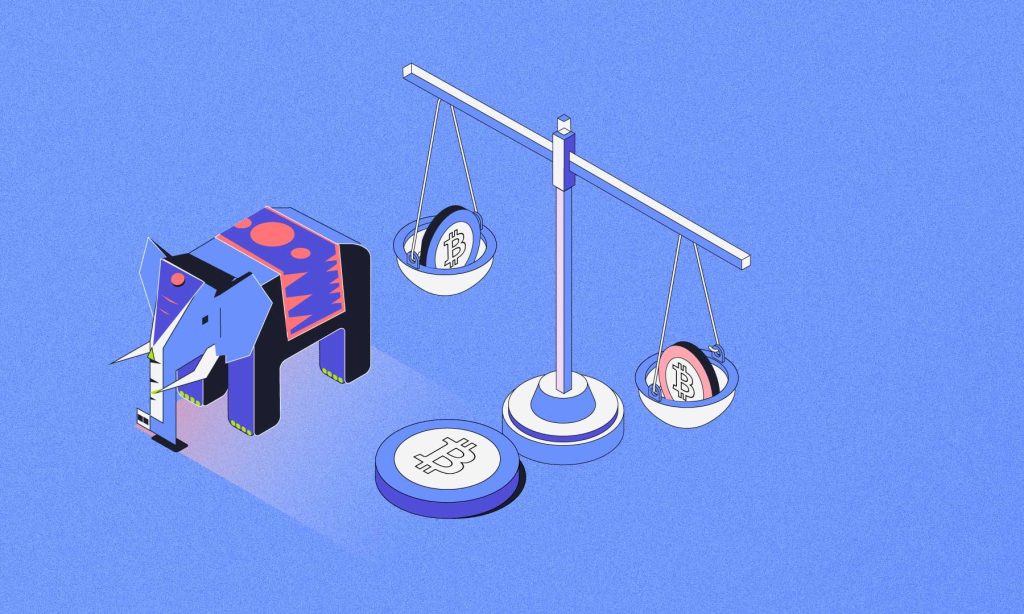Currently, Bitcoin and other crypto assets are not illegal in India but they are unregulated. What does that mean? Well, the answer is complicated.
It doesn’t help that the Reserve Bank of India (RBI), the Supreme Court, and parliamentarians all have their own stances and those stances have kept changing. Which is why we are here to help. But first, a brief detour to set the context.
The history of Bitcoin
Bitcoin—the world’s largest cryptocurrency so far—emerged out of the turmoil of the 2008 economic crisis. The transaction token was meant to serve as a hedge against inflation.
Bitcoin is believed to have been created by an unknown person/group that goes by the name of Satoshi Nakamoto. Nakamoto published a white paper on crypto and mined the first bitcoin ever.
Mining is the process by which new bitcoins are created. But it is also how they are transacted on the blockchain.
Traditionally, third parties like banks and other institutions are involved in financial transactions. These parties may interfere with or reverse transactions, and their involvement may push up transaction costs. This is why Bitcoin created a mode of transaction called mining, which would not involve a third party. To avoid relying on third parties and to maintain the integrity of the network, Bitcoin uses cryptographic proof.
On 22 May 2010, Laszlo Hanyecz, a programmer, became the first to trade BTC. He traded 10,000 bitcoins to buy 2 pizzas, and there has been no looking back since. The 22nd of May has since been observed as “Bitcoin Pizza Day.”
Bitcoin has remained the world’s most popular crypto. It has inspired the development of hundreds of alternative coins (altcoins).
The journey of Bitcoin in India
Bitcoin made its way to India with the arrival of cryptocurrency exchanges. Many exchanges like CoinSwitch emerged in India between 2012 and 2017. The RBI has made it clear that the central bank does not support virtual currencies time and again (as discussed before), but things are changing for the better—for Bitcoin and for its kin. The central bank is now gearing up to launch its own digital Rupee, and some tax regulations now apply to crypto.
Chronology of events
- October–November 2017: The Supreme Court considers several PILs that called for a ban on buying and selling and regulation of cryptos in India.
- December 2017: Statements are issued by the RBI and the Ministry of Finance on cryptocurrencies, comparing them to Ponzi schemes.
- April 2018: An RBI circular bans commercial and co-operative banks, small finance banks, payments banks, payment system providers, and NBFCs from dabbling in virtual currencies and providing services to entities who work in the domain of virtual currencies. Without access to banking services, crypto exchanges find themselves in a pickle.
- May 2018: Some exchanges file a writ petition in the Supreme Court.
- July 2019: A committee submits its report recommending a ban on “private cryptocurrencies” in India.
- March 2020: The Supreme Court revokes RBI’s banking ban on crypto. While overturning the ban, the apex court held that cryptocurrencies are unregulated, but not illegal in India.
- With the SC verdict, the crumbling crypto market springs back to life. Bitcoin registers a whopping 700% jump in the 10 months between April 2020 and February 2021.
- April 2022: A 30% flat tax on capital gains from crypto transactions comes into effect. It applies to the current financial year.
India has emerged as the most prominent crypto market in the world despite the tumultuous ride. According to Chainalysis, a crypto analysis firm, the Indian crypto market grew 641% from July 2020 to June 2021. During this period, transfers worth more than $10 million, representing 42% of transactions, were sent from India-based addresses.
Is Bitcoin mining legal in India?
Currently, Bitcoin is unregulated in India. Cryptos can be mined using personal computing equipment, so it doesn’t break or interfere with any existing law.
Is Cryptocurrency Legal in India?
Yes, it is legal to trade and invest in Bitcoin in India as the sector is unregulated, but Bitcoin is not legal tender in the country.
Some crypto watchers seem to hold the view that the government’s recent move to tax crypto earnings is a way to offer cryptocurrencies some legal recognition, and some argue that things are heading in that direction. But we do not know that yet.
What we do know about Bitcoin’s future is this: the horizon is unclear, but it’s an exciting, dynamic, and volatile space. It helps to keep your DYOR going and exercise caution as we head toward that future.
Can Bitcoin be Converted to Cash in India?
Yes, Bitcoin can be converted to cash in India. All you need to do is deposit the Bitcoins you want to cash on a crypto exchange or an investing platform like CoinSwitch and sell on its market. Once you have the corresponding INR in your wallet, you can easily withdraw in your account.
Is Bitcoin Safe in India?
Bitcoin volatility arises from the digital currency’s unpredictable future. Bitcoin price volatility is worrying in the near term. Prices can fluctuate and tumble by up to 10% in a single day due to rumours and false news. Most of all, cryptos as treated as asset class in India, so YES – Bitcoin is safe in India. But this is all subject to future regulations and laws.
FAQs
Can Indian citizens buy Bitcoin?
Once registered, individuals can deposit funds into their wallets and utilize this amount to buy Bitcoins. In India, investors can buy Bitcoin using Indian Rupees with a minimum capital of Rs. 100.
Can you withdraw Bitcoin into cash in India?
Once the exchange has received your bitcoin, you can request a withdrawal in the currency of your choice. The withdrawal will be paid into your bank account.
Is Bitcoin taxable in India?
In India, gains from cryptocurrency are subject to a 30% tax (along with applicable surcharge and 4% cess) under Section 115BBH.








